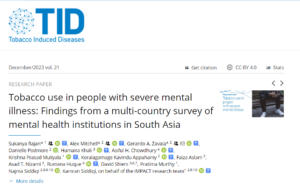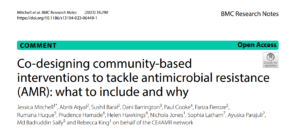People with severe mental illness (SMI) tend to die early due to cardiovascular and respiratory diseases, which may be linked to tobacco use. We conducted a multi-country survey of adults with SMI attending mental health facilities in Bangladesh, India, and Pakistan. Using data collected with a standardized WHO STEPS survey tool. Smoking prevalence in men varied by country (Bangladesh 42.8%, India 20.1% and Pakistan 31.7%); <4% of women reported smoking in each country. Among smokers, 29.1% (n=244) made at least one quit attempt in the past year. As observed in high-income countries, we found higher tobacco use in people with SMI, particularly in men compared with rates reported for the general population in South Asia.



